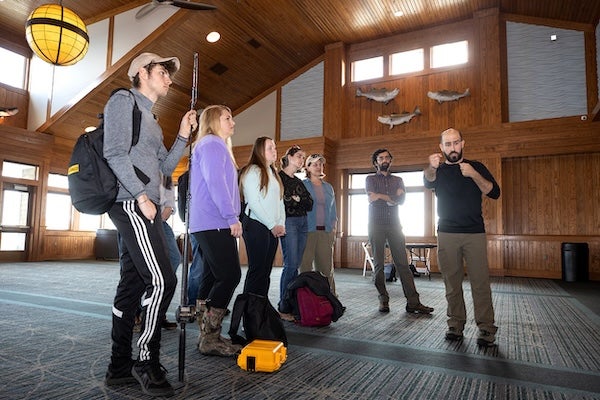ECU’s research efforts earn prestigious R1 status
East Carolina University has reached a transformative milestone in its journey of discovery, securing Research 1 (R1) status and joining the ranks of the nation’s most prestigious academic institutions.
This designation, announced today by the American Council on Education and Carnegie Foundation for the Advancement of Teaching, places ECU among 5% of institutions in the nation that are recognized for having the highest level of research activity.
For decades, ECU has attracted top-tier faculty who are not only distinguished researchers but also dedicated educators, fostering a spirit of discovery and creativity across classrooms, labs and fields. The R1 designation in the Carnegie Classification of Institutes of Higher Education reflects the university’s growing research capacity, the increasing volume of funding secured through grants and an academic environment that encourages innovation and exploration. It is the result of years of growth in external funding, groundbreaking discoveries, preparing doctoral students for careers in higher education and industry, and interdisciplinary collaborations that address critical challenges in health care, technology, education and beyond.
“East Carolina University’s designation as an R1 institution is a testament to the incredible dedication and hard work of our faculty, staff and students,” said ECU Chancellor Philip Rogers. “Our university’s success in research is a direct reflection of our mission — advancing student success, public service and regional transformation. This milestone will open doors to more opportunities for collaboration, discovery and academic excellence.”
Achieving the R1 designation reflects the strength of the university’s research enterprise and will enhance the ability to drive scholarly inquiry in areas critical to North Carolina and beyond, said Dr. Sharon Paynter, chief innovation and engagement officer and interim chief research officer at ECU.

David Lagomasino explains data from a beach model to students at ECU’s Outer Banks Campus.
“Across ECU’s campuses and through fieldwork, researchers pioneer new treatments for critical illness, develop strategies to grow successful businesses, harness the power of natural resources, transform classroom experiences, explore the intersection of creativity and cultural expression, work to improve health care delivery and patient outcomes, and more.” she said. “With an eye toward leveraging rural opportunities, ECU impacts eastern North Carolina and communities across the globe.”
Dr. David Lagomasino, an associate professor of coastal studies, is just one of ECU’s leading researchers in demand for his work with both local and worldwide significance.
He recently secured over $1 million in grants to fund multiple research projects aimed at strengthening coastal ecosystem resilience. His work covers a broad spectrum of coastal issues, including global mangrove decline, sediment movement in Currituck Sound, the relationship between coastal ecosystems and cyclones, and dune restoration efforts along North Carolina’s coastline.
A milestone in research excellence
ECU has long been at the forefront of research in fields like health care, technology and education.
The groundbreaking discoveries stemming from ECU’s research were made possible by a system that effectively secured significant funding. The university’s research community includes more than 420 funded faculty members and 546 graduate students, all engaged in a range of research activities. In 2023 alone, ECU directed $67.1 million to research expenditures including equipment and supplies, staffing, laboratory costs and travel, and over the past four years, grant awards have totaled $326.9 million.
Additionally, ECU provided $8.9 million in funding to graduate students for research in 2024, highlighting its commitment to fostering the next generation of scholars. Programs such as the Maximizing Access to Research Careers (MARC) and Course-based Undergraduate Research Experiences (CUREs) further support undergraduate students in conducting meaningful research, reinforcing the university’s focus on cultivating a research-driven academic environment, and providing transformative educational experiences.

ECU students work in a summer biology lab.
Lovens Paul is a biochemistry major and member of the first MARC cohort at ECU. He is studying the stem cells of fruit flies to understand how a new transport protein impacts stem cell activity in humans.
“I love doing research. It has helped me to think critically, pose questions my textbooks have not answered and think about ways to solve them,” he said. “For example, in my research, I study stem cells. They are critical for the maintenance and repair of tissues in our bodies and contribute to the rejuvenation of the organism.”
ECU is also focused on maximizing the long-term impact of research conducted on campus by assisting researchers in licensing and commercializing their discoveries and facilitating collaboration with community and industry partners.
“We are thrilled that ECU has joined the ranks of prestigious institutions across the country that have a very high level of research activity,” said Mark Phillips, vice president of statewide operations and executive director of the Eastern Regional Office for the North Carolina Biotechnology Center. “We’re thrilled but not surprised. With our close relationship, particularly through NCBiotech’s research grant program, we see how ECU research impacts the life sciences and how it translates into commercial opportunities that are so important to the overall economic impact of the region and across the state.”
What R1 status means for Pirate Nation
Achieving R1 status is noteworthy for both the university and partners like the NC Biotechnology Center, said Paynter.
“Receiving the R1 designation is a significant achievement not just for the university, but for the entire region,” she said. “It will bring new resources, new collaborations, and new opportunities that will help address global challenges and contribute to the local economy. We are excited for what the future holds for our students, faculty and the Pirate Nation.”
For students, the R1 designation increases career opportunities and strengthens ECU’s ability to offer cutting-edge educational resources, preparing graduates to thrive in research-intensive careers.
For faculty and researchers, R1 status provides access to additional funding opportunities, both from federal agencies and private sector partners. This enables faculty to further pursue groundbreaking research and engage in valuable collaborations with other institutions and industries.
For the region, ECU’s elevated status as an R1 university will have a profound economic impact, attracting new research initiatives, business partnerships and local economic development. The university will also serve as a resource hub for community-based research and outreach programs, improving the quality of life in eastern North Carolina.
Dr. Jessica Cooke Bailey, associate professor with the Center for Health Disparities and the Department of Pharmacology and Toxicology at the Brody School of Medicine, joined ECU in 2023 from another R1 institution. She believes that ECU’s R1 designation signifies the university’s continued commitment and longstanding tradition of work that makes a positive impact on eastern North Carolina and beyond.
“I came to ECU because of the university’s commitment to serving the region while staying true to what makes this institution unique — focusing on meaningful, impactful research,” she said. “ECU has given me the space to grow my research program so that I can continue producing work that matters. I believe the move to R1 status is an incredible opportunity to attract more students, who will shape the future of science and medicine, as well as to grow our internal research infrastructure.”
To learn more about the research at the university and its R1 designation, visit ECU’s R1 website.
